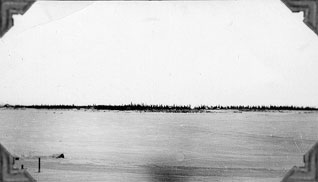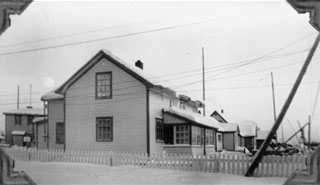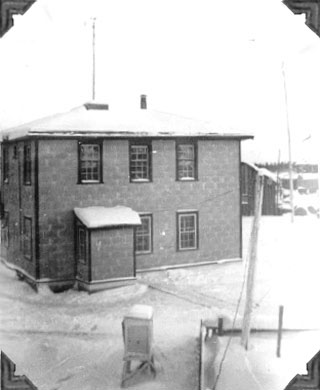Page 8: Aklavik (continued)

View
from our front window, noon, December 15, 1952. The sun is just above
the horizon.
Midnight
Sun
Across
the river, in the distance, we could see the Richardson Mountains.
Shortly after the middle of December the sun would completely disappear
behind them. Aklavik would be in complete darkness, day and night
- apart from a couple of hours of deep twilight at noon - until the
sun made its reappearance in mid-January. It would then peek coyly
over the horizon, grudgingly presenting us with a distant glow and
a few flat rays of light. Eventually, after a few days, it reluctantly
decided to make a full reappearance.
In
the middle of summer the sun had a completely different program. We
were then exposed, perhaps in compensation for the winter darkness,
to twenty-four hours of daylight. Everyone, especially the children,
found it extremely difficult to get to sleep, and people could be
seen happily strolling along the riverbank at midnight or sitting
there comfortably reading a newspaper. This disconcerting season lasted
for about six weeks. In one particular way the long hours of sunshine
were a real boon, as they resulted in a very fast growing season for
the few garden crops that could be planted; lettuces sprouted and
grew like magic.
In
the winter, when twenty-four hours of darkness was the norm, parents
complained that it was even more difficult than usual to get their
children up for school, as it felt like waking up in the middle of
the night. The rapid transition between these two seasonal extremes,
complete daylight and complete darkness, made time seem to pass much
faster than it did in the seasons of the south.
Although
the days and nights in winter were very long and dark, there was compensation
to be found in spectacular displays of the northern lights. And on
clear nights the moon and stars seemed to shine with an exceptionally
brilliant and pure light against the rich, deep dark blue sky.

The
assistant commissioner's house, with Signals radio station at left
rear.
The
Social Whirl
I
was both surprised and pleased to find that in the house next but
one to ours lived an English family, the NWT Assistant Commissioner
LACO Hunt and his wife, Barbara, and their two young sons, Peter and
David. I was even more delighted to discover that Barbara had gone
to one of the group of schools in London to which my school belonged.
It
was completely unexpected to find such a neighbour in such a remote
place, and I much enjoyed Barbara's company. Her husband, LACO Hunt,
had also been born in England, but had come to northern Canada in
1928, at the age of nineteen, to work for the Hudson's Bay Company.
He had a vast experience of the North and later wrote a fascinating
book, Rebels, Rascals & Royalty (edited by Barbara) about his
life there and in Ottawa, including an interesting chapter on their
stay in Aklavik.
It
was also very pleasant to have a more varied social life again and
we were grateful for the kind welcome that the people of Aklavik gave
us. Soon after we arrived, the ladies gave me a baby shower, the first
shower I had ever been given. It was a real surprise, one I very much
appreciated, and very kind of them.
One
amusement that our social circle thoroughly enjoyed was playing bridge,
in which pursuit Dr. Christensen, from the Anglican hospital, did
his best to instruct us. I don't think we were very apt pupils - I
still remember his despairing cries of "Finesse, finesse!"
echoing through the room in his delightful Danish accent. But we did
enjoy trying. Previous to his stay in Aklavik, Dr. Christensen had
spent twenty-seven years working with the Natives in Greenland, so
he was no stranger to our environment, nor to his position as assistant
to Dr. Ward of the Department of Indian Affairs.
Dick
took an active and enthusiastic part in a sport that originated from
a rather different part of the north - Scotland. Curling had been
introduced into Aklavik in 1948 by Bill Carson, the local Hudson's
Bay Company manager, when he organized some of the inhabitants to
form the Arctic Circle Curling Club. The first rock was thrown on
October 25 of that year. One of the interested spectators, Sammy Uktituk,
was heard to comment, "White man push rock, sweep ice, then yell
and frighten fish." The curling building was a temporary affair
built for the season and then dismantled and stored during the summer.
As it had been erected upon a small lake, Sammy's was a relevant remark.
The lake ice, however, turned out to be unsatisfactory, heaving, becoming
brittle, flaking off, and developing cracks. The seven or eight men's
teams and the six ladies' teams enjoyed themselves, however, and the
next year the building was re-erected on the river ice. It was hoped
that the fast-flowing water under the ice would keep the surface more
stable. This move did seem to solve the problem, as curling was flourishing
and very popular in the winter of 1952-53, when we were there.
New
Baby
The
most important event of our life in Aklavik was the birth of our second
son, Ian. His arrival was a rather different experience to that of
his elder brother in Yellowknife. This time my journey to hospital
was merely a short walk along the riverbank to the Roman Catholic
hospital. Dear Sister Lemire, who had been the Grey Nun nurse in Fort
Providence, was looking forward to being present at this birth, as
she had been unable to be present at Christopher's arrival.
After
the usual wait for labour to progress, I arrived at last in the operating
theatre for the delivery - and discovered that the hospital was down
to its last container of ether. October, of course, was freeze-up
time in Aklavik, and it was impossible for any plane to land on the
river until the ice became firm enough to take its weight. As this
highly desirable condition had not been achieved by the time I entered
hospital, more ether was not expected until some time in the future.
For fear that the container would be dismally empty when I desperately
needed the gas for pain relief, I refused it for as long as I could
manage. Happily there was plenty for my needs, and the baby duly made
his appearance - a week early - on his father's birthday, without
causing his mother undue discomfort. We thought he made rather a good
birthday present!
Ian was born on a Sunday, and during the progress of the birth, the
local radio was broadcasting High Mass. All of us in the operating
theatre could hear the service, as there was a loudspeaker in the
corridor outside. It was both a surprise and a totally unexpected
thrill to hear the officiating priest announce the arrival of the
new baby at the end of Mass! The radio was, of course, tuned to CHAK,
the friendly voice of the Arctic.

Aklavik
Signals radio station
When
Dick received the news of a new addition to the family, he was on
the roof of the Signals station, replacing the old aerial with a new
one. It was quite some time before he was able to get off the roof
and walk down to the hospital to see his new son!
I
was delighted to discover that in this northern hospital you were
allowed to have your baby in a crib in your own room instead of in
a baby ward some distance away. I thought this was a wonderful idea
and much to be preferred over the old way. The Grey Nun nursing sisters
were very kind and friendly and said they enjoyed seeing a blue-eyed
baby as a change from their usual brown-eyed Native babies.
The
hospital had been founded in 1925, when three Grey Nuns started a
school in a log cabin, and this small start had developed into a hospital.
Nine years after Ian's birth, in 1961, I read in the Whitehorse Star
that, because a large portion of the population of Aklavik had been
transferred to Inuvik, the hospital and the convent of the Grey Nuns
who staffed it had been closed down.
Ian Richard soon took his place in our household. We all settled down
and found that life in Aklavik was in some ways very similar to that
in Fort Providence. The yearly food rations and all the other supplies
still came in by riverboat in the summer. The mosquitoes were as much
of a pest. The river froze and melted with the seasons as it did in
Fort Providence. Messages and weather reports still had to be dealt
with. Diapers still needed to be washed and dried. And the family
still needed to be fed.
[Next
Page]
Pages: [1]
[2] [3]
[4] [5]
[6] [7]
[8] [9] [10]
[11] [12]
[13] [14]
[15] [16]
Return to top of
page
Return to the Watts
Family page